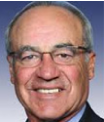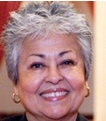An atypical internecine feud has broken out between two of San Bernardino County’s Democratic office holders.
Joe Baca, who has been the U.S. Representative for California’s 43rd Congressional District since 2003 and was the U.S. Representative for California’s former 42nd Congressional District from November 16, 1999 to January 3, 2003, state senator in the former 32nd Senatorial District in 1998 and 1999 and assemblyman in the former 62nd Assembly District from 1992 to 1998, is having his Congressional tenure challenged by state Senator Gloria Negrete McLeod.
In the first primary race in the redrawn 35th Congressional District, McLeod is at present the only one challenging Baca for the Democratic nomination.
Negrete-McLeod has been state sentator in the 32nd Senatorial District since December 2006. Prior to that, she served three terms in the California State Assembly from 2000 to 2006. Because of California’s term limits, she must vacate the state legislature.
For Negrete-McLeod, Congressman Joe Baca, Sr. is a logical opponent. In her drive to capture the state Senate seat in 2006, she defeated Joe Baca, Jr. in the Democratic primary. A degree of tension has remained between the Baca and Negrete-McLeod camps ever since, though Negrete-McLeod did begrudgingly endorse Joe Baca, Sr. in his last two reelection efforts. Young Joe Baca went on to win a seat on the Rialto City Council. The Baca Family Political Dynasty suffered something of a setback when another of Joe Baca’s sons, Jeremy, was defeated in his effort to be elected to the Colton City Council in 2008.
Negrete-McLeod beat Joe Baca to the punch in declaring her candidacy in the new 35th Congressional District. The state Citizens Redistricting Commission in May laid out the boundaries of California’s various political districts, and Negrete-McLeod, who lives in Montclair, almost immediately declared her candidacy in the 35th. Baca, who lives in a portion of Rialto just outside the 35th District boundaries, was at that time contemplating running in the newly formed 31st Congressional District, which includes San Bernardino, Redlands, Loma Linda, Grand Terrace, Rancho Cucamonga and southern Upland.
The 35th District consists of Chino, Montclair, Pomona, Ontario, Bloomington and portions of Fontana and Rialto. Members of Congress do not have to live in the district they represent.
Throughout his Congressional career, Baca has consistently achieved election and reelection in districts in which the Democrats had a substantial voter registration advantage over Republicans. In his current 43rd Congressional District, the Democrats enjoy a 48 percent to 32 percent advantage over Republicans. In the newly redrawn 35th Congressional District, Democrats hold a sizeable registration lead over Democrats as well. In the newly redrawn 31st District, Democrats hold a registration lead, but it is far less substantial, of just under four percent. Given the propensity for greater Republican turnout at the polls on election day as well as the consideration that incumbent Republican Congressman Gary Miller, who has a substantial campaign war chest, is a declared candidate in the 31st Congressional District, Baca’s calculation is that he stands a better chance of securing the Democratic nomination in the safely Democratic 35th against Negrete-McLeod in the June primary and then cruising to an easy victory in November than going toe-to-toe with Miller for all of the marbles in the 31st next November.
On February 11, Baca was able to test that strategy when the California Democratic Party convened in San Diego for a session aimed at determining party endorsements well in advance of the primary. On that day, Saturday, Baca ended in a 24-to-24 tie with Negrete-McLeod in the competition for the endorsements of local party delegates.
A series of charges and countercharges between the Baca and Negrete-McLeod camps ensued, with each accusing the other of falsifying ballot signatures. Early on Sunday, February 12, the party’s credentials review committee adjudicated the conflicting accusations by Baca and Negrete-McLeod supporters, declaring that 49 ballots had been cast and that Baca had prevailed 25-to-24 in the battle for the party’s endorsement. In a contest between two non-incumbent Democrats vying for an elected position, party rules require that a candidate clearly prevail by obtaining 60 percent of the ballots cast. But as an incumbent Congressman, Baca needed only fifty percent plus-one to take home the party’s official support. The dead heat between Baca and Negrete-McLeod was the narrowest finish between any of the state’s Democratic races involving an incumbent and a non-incumbent challenger.
“Winning this hard-fought battle is a critical step as I move forward in my quest for re-election,” Baca said. Negrete-McLeod did not meet a deadline to gather 300 conventioneer signatures to request the convention to rescind the endorsement because it did not meet the 60 percent threshold.
Baca will be able to make note of his endorsement by the party in the sample ballots sent to voters in advance of the primary. But observers believe Baca may have some rough sledding ahead, given Negrete-McLeod’s strong showing and her familiarity with voters in the 35th District.
Another consideration in this year’s primary contest is the top-two balloting being tried for the first time. If McLeod does well in the primary and outpolls all of the Republicans vying in the contest but does not defeat Baca outright, that will set up a run-off between her and Baca in November. Even if she is outdistanced by Baca in November among Democrats, she could still win if she captures the lion’s share of the Republican vote and has a respectable second place showing among Democratic voters.


